Crossref Citations
This Book has been
cited by the following publications. This list is generated based on data provided by Crossref.
Hoskins, Andrew
and
O'Loughlin, Ben
2015.
Arrested war: the third phase of mediatization.
Information, Communication & Society,
Vol. 18,
Issue. 11,
p.
1320.
Gottschlich, JJrg
and
Hinz, Oliver
2016.
The Open Tariff Model - Towards Efficient Cost Comparison of Public Cloud Services.
SSRN Electronic Journal ,
Carlsson, Ulla
2016.
Freedom of expression in the digital transition.
Journal of Media Business Studies,
Vol. 13,
Issue. 3,
p.
187.
Khazraee, Emad
and
Losey, James
2016.
Evolving repertoires: Digital media use in contentious politics.
Communication and the Public,
Vol. 1,
Issue. 1,
p.
39.
Hayden, Craig
2017.
The Real Cyber War: The Political Economy of Internet Freedom.
Journal of Broadcasting & Electronic Media,
Vol. 61,
Issue. 1,
p.
190.
Aronczyk, Melissa
2017.
Everyday Nationhood.
p.
241.
Haggart, Blayne
and
Jablonski, Michael
2017.
Internet freedom and copyright maximalism: Contradictory hypocrisy or complementary policies?.
The Information Society,
Vol. 33,
Issue. 3,
p.
103.
Williams, Ann E.
and
Toula, Christopher M.
2017.
Solidarity Framing at the Union of National and Transnational Public Spheres.
Journalism Studies,
Vol. 18,
Issue. 12,
p.
1576.
Camaj, Lindita
2018.
Blurring the boundaries between journalism and activism: A transparency agenda-building case study from Bulgaria.
Journalism,
Vol. 19,
Issue. 7,
p.
994.
Szostek, Joanna
2018.
Nothing Is True? The Credibility of News and Conflicting Narratives during “Information War” in Ukraine.
The International Journal of Press/Politics,
Vol. 23,
Issue. 1,
p.
116.
Ristovska, Sandra
and
Price, Monroe
2018.
Visual Imagery and Human Rights Practice.
p.
1.
Ferrari, Federica
and
O’Loughlin, Ben
2018.
Doing Politics.
Vol. 80,
Issue. ,
p.
385.
2018.
Nationalism, Social Movements, and Activism in Contemporary Society.
p.
1.
Sharakhina, Larisa V.
Girenkov, Artem
Skvortsova, Vera
and
Glitsman, Ksenia
2018.
Brand communication tools transformation in digital society.
p.
57.
Michaelsen, Marcus
2018.
Exit and voice in a digital age: Iran’s exiled activists and the authoritarian state.
Globalizations,
Vol. 15,
Issue. 2,
p.
248.
Budnitsky, Stanislav
and
Jia, Lianrui
2018.
Branding Internet sovereignty: Digital media and the Chinese–Russian cyberalliance.
European Journal of Cultural Studies,
Vol. 21,
Issue. 5,
p.
594.
Wojcieszak, Magdalena
Nisbet, Erik C.
Kremer, Lea
Behrouzian, Golnoosh
and
Glynn, Carroll
2019.
What Drives Media Use in Authoritarian Regimes? Extending Selective Exposure Theory to Iran.
The International Journal of Press/Politics,
Vol. 24,
Issue. 1,
p.
69.
Ristovska, Sandra
2019.
Human rights collectives as visual experts: the case of Syrian Archive.
Visual Communication,
Vol. 18,
Issue. 3,
p.
333.
Seyfi, Siamak
and
Hall, C. Michael
2020.
Political transitions and transition events in a tourism destination.
International Journal of Tourism Research,
Vol. 22,
Issue. 4,
p.
493.
Grigor (Khaldarova), Irina
and
Pantti, Mervi
2021.
Visual images as affective anchors: strategic narratives in Russia’s Channel One coverage of the Syrian and Ukrainian conflicts.
Russian Journal of Communication,
Vol. 13,
Issue. 2,
p.
140.





